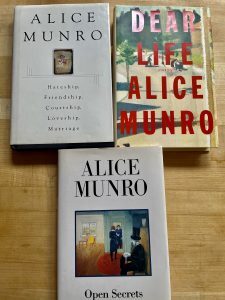A gratitude call
A great gift yesterday — I made a gratitude call I’ve been wanting to make for many years.
In 1974 I was a young actress in Victoria hired to do a three-month school tour. The play we were touring turned out to be a jumbled version of various Greek myths; the production was badly directed, garbled, and in some instances, ridiculous (described, briefly, in the essay on my acting career in Midlife Solo). I was appalled, not just that I’d have to tour this thing for months, but that we were taking it to schools; I thought we’d turn kids off theatre for life.
An older actress named Kim Yaroshevskaya was working in Victoria and came to see the preview. Afterwards, I took her aside to ask her advice on how to survive the next months. She thought for a long while, and then she said, “Think of this production as a cruel and ugly child that has been entrusted to your care.”
That advice saved my skin then and for other shows. In my career I encountered several cruel and ugly children, but they needed me to give them what tenderness and skill I could, and I did my best. I’ve wanted to thank Kim ever since and have tried to find her. Recently, my friend Kathleen in Montreal posted an old picture with her, and when I asked, told me she’s a hundred years old and blind and sent me her phone number. I called with some trepidation.
What a wonderful chat we had. She kept saying, “Thank you, thank you!” And she told me if I wanted to know about her life, to read her book, which I have since ordered from the library.
The warmth from this encounter carried me through yesterday, as the country and the world was and is still dealing with the fallout of the Alice tragedy. As usually, the condemnation is harsh and unforgiving, without context. This is what I posted on FB and IG today:
Another article about Alice and Andrea in the Star this morning, which ends with what is to me a horrifying image: someone posting a picture of Alice’s books in a garbage can. Once again, we rush to condemn, unwilling to grasp nuance and context in a painful story. Fact: a woman born in 1931 who, years after the events in question, refused to deal with her daughter’s abuse by her husband; she left him but returned and lived with him until his death. Context: When and where Alice grew up, no one protected children or dealt with any form of abuse, and a woman needed a man. Alice loved Gerry, but also, she lived in his house, in the country; she didn’t drive, and as Margaret Atwood makes clear in today’s article, she had few practical skills. Gerry took care of daily life while she wrote. She needed him to survive and to work, and she chose him. She chose her work. We can condemn her for validating her own needs over the needs of her child, absolutely, especially with something as heinous as abuse. But nonetheless, she will always be one of the world’s great writers, a woman who saw the frailties and evil, blindness and desperation in the human soul and wrote it with extraordinary clarity and courage.Women since time immemorial have turned a blind eye to the flaws of the men they love, even at the expense of their children. This in no way excuses them. But if we only read books by stellar human beings, we’d not read at all. No matter her grievous sins as a mother and a woman, her books are part of the world’s artistic treasure.
The post A gratitude call appeared first on Beth Kaplan.



